虚拟语气倒装
虚拟语气倒装讲义
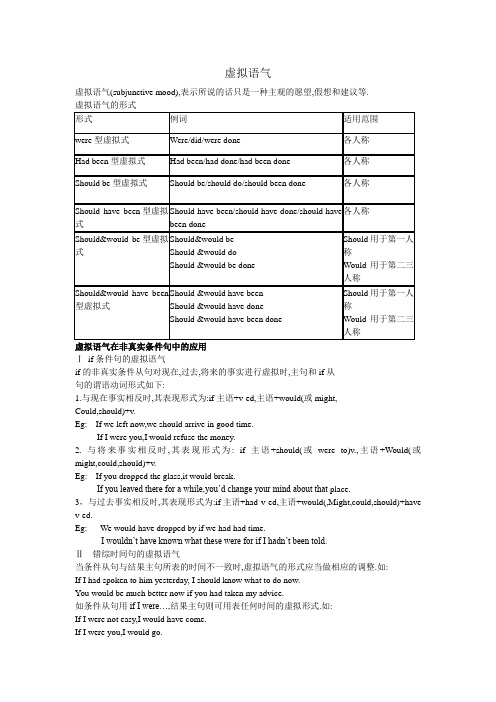
Ⅴ虚拟语气在in case,lest或for fear that等从句中的用法
in case,lest或for fear that引起的从句常用虚拟语气,表示“以防,以免”,形式为should+动词原形,should通常不能省略.
1.I finally got the job I dreamed about.Never in my life___
so happy!(2000,spring)
A did I feel B Ifeel C I had felt D had I felt
2.The old couple have been married for 40 years and never once__with each other.(2003)
主语+be+adj.+that+主语+should+动词原形
主语+be+adj.+that+主语+should have+过去分词
Eg :I am happy that he should agree.
I am ashamed that you should have done such a thing.
Eg :He took his raincoat with him in case it should rain.
The young driver looked over the engine carefully lest it should go wrong on the way.
Ⅵ虚拟语气在形容词短语的that宾语从句中的应用
含有虚拟语气的倒装句
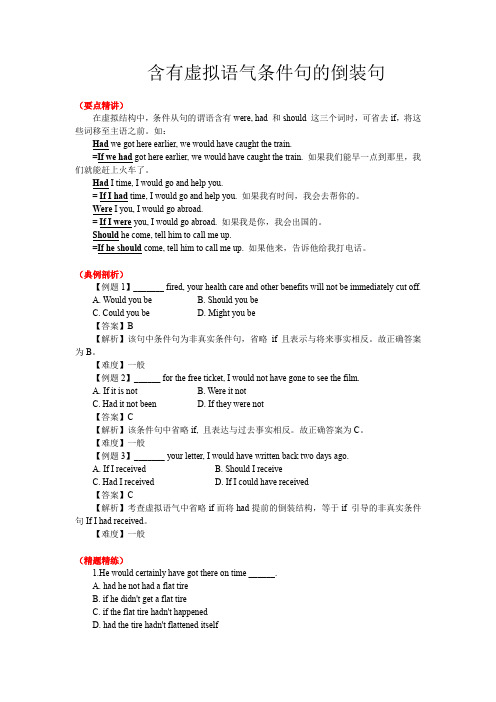
含有虚拟语气条件句的倒装句(要点精讲)在虚拟结构中,条件从句的谓语含有were, had 和should 这三个词时,可省去if,将这些词移至主语之前。
如:Had we got here earlier, we would have caught the train.=If we had got here earlier, we would have caught the train. 如果我们能早一点到那里,我们就能赶上火车了。
Had I time, I would go and help you.= If I had time, I would go and help you. 如果我有时间,我会去帮你的。
Were I you, I would go abroad.= If I were you, I would go abroad. 如果我是你,我会出国的。
Should he come, tell him to call me up.=If he should come, tell him to call me up. 如果他来,告诉他给我打电话。
(典例剖析)【例题1】_______ fired, your health care and other benefits will not be immediately cut off.A. Would you beB. Should you beC. Could you beD. Might you be【答案】B【解析】该句中条件句为非真实条件句,省略if且表示与将来事实相反。
故正确答案为B。
【难度】一般【例题2】______ for the free ticket, I would not have gone to see the film.A. If it is notB. Were it notC. Had it not beenD. If they were not【答案】C【解析】该条件句中省略if, 且表达与过去事实相反。
虚拟语气和倒装句讲解
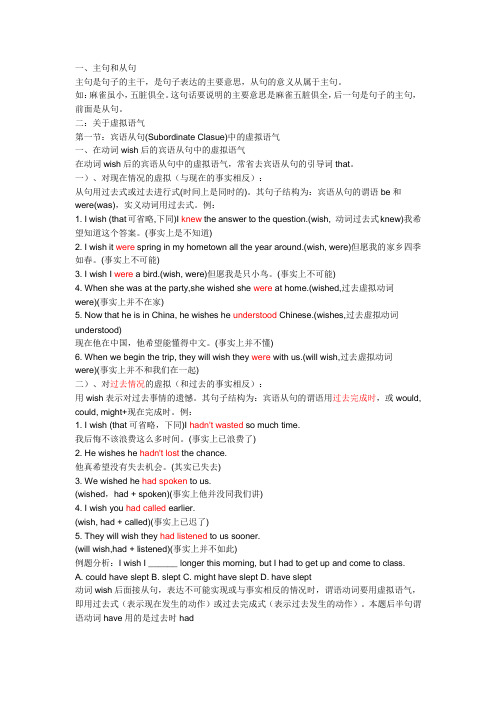
一、主句和从句主句是句子的主干,是句子表达的主要意思,从句的意义从属于主句。
如:麻雀虽小,五脏俱全。
这句话要说明的主要意思是麻雀五脏俱全,后一句是句子的主句,前面是从句。
二:关于虚拟语气第一节:宾语从句(Subordinate Clasue)中的虚拟语气一、在动词wish后的宾语从句中的虚拟语气在动词wish后的宾语从句中的虚拟语气,常省去宾语从句的引导词that。
一)、对现在情况的虚拟(与现在的事实相反):从句用过去式或过去进行式(时间上是同时的)。
其句子结构为:宾语从句的谓语be和were(was),实义动词用过去式。
例:1. I wish (that可省略,下同)I knew the answer to the question.(wish, 动词过去式knew)我希望知道这个答案。
(事实上是不知道)2. I wish it were spring in my hometown all the year around.(wish, were)但愿我的家乡四季如春。
(事实上不可能)3. I wish I were a bird.(wish, were)但愿我是只小鸟。
(事实上不可能)4. When she was at the party,she wished she were at home.(wished,过去虚拟动词were)(事实上并不在家)5. Now that he is in China, he wishes he understood Chinese.(wishes,过去虚拟动词understood)现在他在中国,他希望能懂得中文。
(事实上并不懂)6. When we begin the trip, they will wish they were with us.(will wish,过去虚拟动词were)(事实上并不和我们在一起)二)、对过去情况的虚拟(和过去的事实相反):用wish表示对过去事情的遗憾。
(完整版)虚拟语气倒装(讲解+练习)

虚拟语气有些条件句是可能实现的,称为真实条件句. 虚拟语气是动词的一种特殊形式,用来表达说话人的意愿.请求,设想,等未能或不可能实现的事实,或说话人看来实现可能性很小的情况.做这类题时首先要弄清楚虚拟语气的各种句型,即由if引导的虚拟条件句,省略if的倒装形式,可跟虚拟语气的宾语从句,同位语从句,表语从句的句型,以及表示祝愿或感叹的句子和由without, but for等介词引导的短语或句子.主要用法1). 主语从句,同位语从句中虚拟语气的用法.2). 宾语从句中虚拟语气的用法,尤其是wish 虚拟语气结构的用法.3). If条件句中虚拟语气的用法,应特别注意省略if的倒装结构是考试的重点.4). would rather(=wish)等结构中虚拟语气的用法.5). if only(如果。
就好了)结构中虚拟语气的用法.6). But, or, otherwise 等含蓄条件句的用法.7). It’s time (that)(早该。
)等结构中虚拟语气的用法.1. 虚拟语气在虚拟条件句中的运用(1) 虚拟语气现在时,用以表示与现在/将来事实相反的假设或现在实现可能性不大的情况.Eg. If I were a bird, I would fly to you.If it is not for their help, we shall be in a very difficult position.If it were not for their help, we should be in a very difficult position.If I had seen the film, I would…..(2) 虚拟语气过去式. 表示与过去事实完全相反的假设.Eg. If we had started earlier, we should not have missed the train.If she hadn’t been ill, she might have come.If she were not ill, she might come.◆书面语中,如果从句里含有should, had, were或其他助动词,则可将从属连词if省去,将助动词.情态动词.be或have放在句首形成部分倒装.Eg.Were he in your position,he’d do the same.If he Were in your position,he’d do the same.Had I had time, I would have done that yesterday.If I Had had time, I would have done that yesterday.If he Should (万一)come tomorrow, I should give him the dictionary.(3) 虚拟语气在某些从句中的应用.A)在(表现了说话人的愿望)wish, suggest, order, demand, propose,command, request, recommend, require, decide, insist, desire,urge等动词的宾语从句(should:应该) + 动词原形.以及would rather /sooner that后要用“ (should:应该) + 动词原形” 来表示愿望,建议,命令,要求等;由上述动词派生或转化的名词suggestion, proposal, plan,motion, recommendation, demand, order, desire, request,requirement, insistence, advice, decision , obligatory(义不容辞的,必须的同位语从句或表语从句中也要用相应的虚拟形式.Eg. His suggestion was that we (should) go at once.Wang insisted that we go at once.B)在It is/was + 某些形容词 + that (表现了说话人的愿望)从句的句型中,that从句中的谓语动词常用虚拟语气,即“should + 动词原形”这些形容词有:important, necessary, essential, imperative, natural, strange,advisable, desirable, possible, probable, astonishing,surprising, desired, suggested, requested, recommended,ordered, proposed, decided, moved等.C) “ should(居然/竟然) + 动词原形(或完成形式)” 可表示惊奇,遗憾,怀疑,不满等.ⅰ. 用于expect, believe, think, suspect 等动词的否定或疑问形式后的宾语从句中.Eg. I never expected that the new apartment should be so small.ⅱ. 用于“It is a pity, it is a shame, it is no wonder 等+ that”等结构后的主语从句中.Eg. It is a pity that he should be so careless.D) 在由for fear that, in case, lest 等引导的状语从句中,用“ should (万一)+ 动词原形” 表示“惟恐”的意思.Eg. He handled the instrument with care for fear that it should be damaged.E) 在“ It is (about/ high ) time + that (从句)(早就应该)” 中,谓语动词常用过去式表表示虚拟语气.Eg. It is high time that Chinese people learnt English.F) 在“as if/ as though”(似乎/好像) 引导的状语从句中,谓语动词与wish的宾语从句的虚拟形式相同.Eg. He w ork s with such enthusiasm as if he never knew fatigue. He speaks English as though he were an American.G) 在 look/sound/feel/ seem + as if / as though从句中,当表示真实情况时,用陈述语气; 否则,用虚拟语气.Eg.It seems as if they know each other. (真实情况)It seems as if they knew each other.It seems as though it were already spring. (虚拟语气)H) 用在if only(如果。
虚拟语气倒装

虚拟语气倒装当虚拟条件句中含有were,had,should,could等动词时,可以将if省略,然后将were,had,should,could 等词移至句首:1)If he should fail,he would kill himself.→Should he fail,he would kill himself.万一失败,他就会自杀。
2)If I were you,I would do it at once.→Were I you,I would do it at once.假若我是你,我就会马上做。
3)If I could do it,I would.→Could I do it,I would.要是我能做此事,我一定会做。
4)If he had seen you yesterday,he would have asked you about it.→Had he seen you yesterday,he would have asked you about it.他昨天要是看到了你,他就会问你这事了。
再看一些例句:1)Were they here now, they could help us.=If they were here now, they could help us.他们现在在的话,就会帮助我们了。
2)Had you come earlier, you would have met him.=If you had come earlier, you would have met him.你来得早一点,就碰到他了。
3)Should it rain, the crops would be saved.=Were it to rain, the crops would be saved.假如下雨,庄稼就有救了。
4)Were I(= If I were)in your place,I wouldn’t do it.5)Had you(= If you had)seen it,you would have believed.6)Were they to get married(= If they were to get married),the would not be happy.7)Should he come,tell him to ring me up.他要是来了,让他给我打个电话。
虚拟语气倒装(讲解+练习)
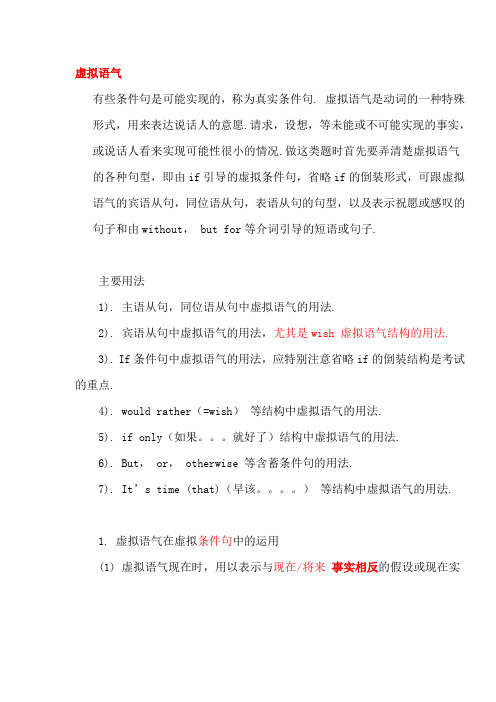
虚拟语气有些条件句是可能实现的,称为真实条件句. 虚拟语气是动词的一种特殊形式,用来表达说话人的意愿.请求,设想,等未能或不可能实现的事实,或说话人看来实现可能性很小的情况.做这类题时首先要弄清楚虚拟语气的各种句型,即由if引导的虚拟条件句,省略if的倒装形式,可跟虚拟语气的宾语从句,同位语从句,表语从句的句型,以及表示祝愿或感叹的句子和由without, but for等介词引导的短语或句子.主要用法1). 主语从句,同位语从句中虚拟语气的用法.2). 宾语从句中虚拟语气的用法,尤其是wish 虚拟语气结构的用法.3). If条件句中虚拟语气的用法,应特别注意省略if的倒装结构是考试的重点.4). would rather(=wish)等结构中虚拟语气的用法.5). if only(如果。
就好了)结构中虚拟语气的用法.6). But, or, otherwise 等含蓄条件句的用法.7). It’s time (that)(早该。
)等结构中虚拟语气的用法.1. 虚拟语气在虚拟条件句中的运用(1) 虚拟语气现在时,用以表示与现在/将来事实相反的假设或现在实现可能性不大的情况.Eg. If I were a bird, I would fly to you.If it is not for their help, we shall be in a very difficult position.If it were not for their help, we should be in a very difficult position.If I had seen the film, I would…..(2) 虚拟语气过去式. 表示与过去事实完全相反的假设.Eg. If we had started earlier, we should not have missed the train.If she hadn’t been ill, she might have come.If she were not ill, she might come.◆书面语中,如果从句里含有should, had, were或其他助动词,则可将从属连词if省去,将助动词.情态动词.be或have放在句首形成部分倒装.Eg.Were he in your position,he’d do the same.If he Were in your position,he’d do the same.Had I had time, I would have done that yesterday.If I Had had time, I would have done that yesterday.If he Should (万一)come tomorrow, I should give him the dictionary.(3) 虚拟语气在某些从句中的应用.A)在(表现了说话人的愿望)wish, suggest, order, demand, propose,command, request, recommend, require, decide, insist, desire,urge等动词的宾语从句(should:应该) + 动词原形.以及would rather /sooner that后要用“ (should:应该) + 动词原形” 来表示愿望,建议,命令,要求等;由上述动词派生或转化的名词suggestion, proposal, plan,motion, recommendation, demand, order, desire, request,requirement, insistence, advice, decision , obligatory(义不容辞的,必须的同位语从句或表语从句中也要用相应的虚拟形式.Eg. His suggestion was that we (should) go at once.Wang insisted that we go at once.B)在It is/was + 某些形容词 + that (表现了说话人的愿望)从句的句型中,that从句中的谓语动词常用虚拟语气,即“should + 动词原形”这些形容词有:important, necessary, essential, imperative, natural, strange,advisable, desirable, possible, probable, astonishing,surprising, desired, suggested, requested, recommended,ordered, proposed, decided, moved等.C) “ should(居然/竟然) + 动词原形(或完成形式)” 可表示惊奇,遗憾,怀疑,不满等.ⅰ. 用于expect, believe, think, suspect 等动词的否定或疑问形式后的宾语从句中.Eg. I never expected that the new apartment should be so small.ⅱ. 用于“It is a pity, it is a shame, it is no wonder 等+ that”等结构后的主语从句中.Eg. It is a pity that he should be so careless.D) 在由for fear that, in case, lest 等引导的状语从句中,用“ should (万一)+ 动词原形” 表示“惟恐”的意思.Eg. He handled the instrument with care for fear that it should be damaged.E) 在“ It is (about/ high ) time + that (从句)(早就应该)” 中,谓语动词常用过去式表表示虚拟语气.Eg. It is high time that Chinese people learnt English.F) 在“as if/ as though”(似乎/好像) 引导的状语从句中,谓语动词与wish的宾语从句的虚拟形式相同.Eg. He w ork s with such enthusiasm as if he never knew fatigue. He speaks English as though he were an American.G) 在 look/sound/feel/ seem + as if / as though从句中,当表示真实情况时,用陈述语气; 否则,用虚拟语气.Eg.It seems as if they know each other. (真实情况)It seems as if they knew each other.It seems as though it were already spring. (虚拟语气)H) 用在if only(如果。
情态动词的虚拟语气中,只有哪个可以倒装?
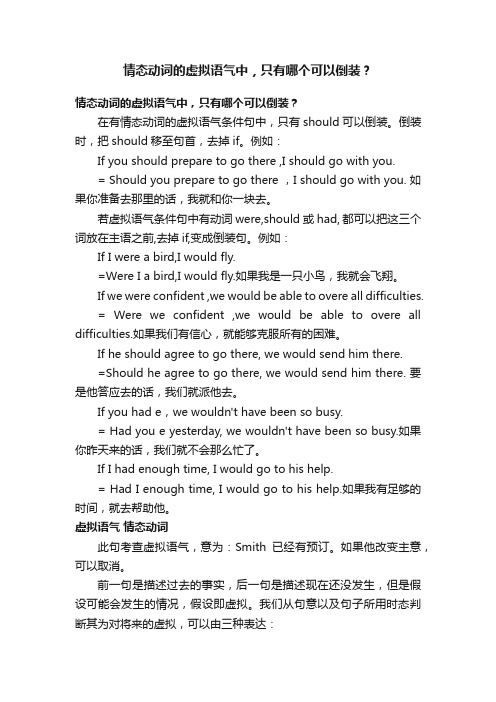
情态动词的虚拟语气中,只有哪个可以倒装?情态动词的虚拟语气中,只有哪个可以倒装?在有情态动词的虚拟语气条件句中,只有should可以倒装。
倒装时,把should移至句首,去掉if。
例如:If you should prepare to go there ,I should go with you.= Should you prepare to go there ,I should go with you. 如果你准备去那里的话,我就和你一块去。
若虚拟语气条件句中有动词were,should或had, 都可以把这三个词放在主语之前,去掉if,变成倒装句。
例如:If I were a bird,I would fly.=Were I a bird,I would fly.如果我是一只小鸟,我就会飞翔。
If we were confident ,we would be able to overe all difficulties.= Were we confident ,we would be able to overe all difficulties.如果我们有信心,就能够克服所有的困难。
If he should agree to go there, we would send him there.=Should he agree to go there, we would send him there. 要是他答应去的话,我们就派他去。
If you had e,we wouldn't have been so busy.= Had you e yesterday, we wouldn't have been so busy.如果你昨天来的话,我们就不会那么忙了。
If I had enough time, I would go to his help.= Had I enough time, I would go to his help.如果我有足够的时间,就去帮助他。
虚拟语气 倒装
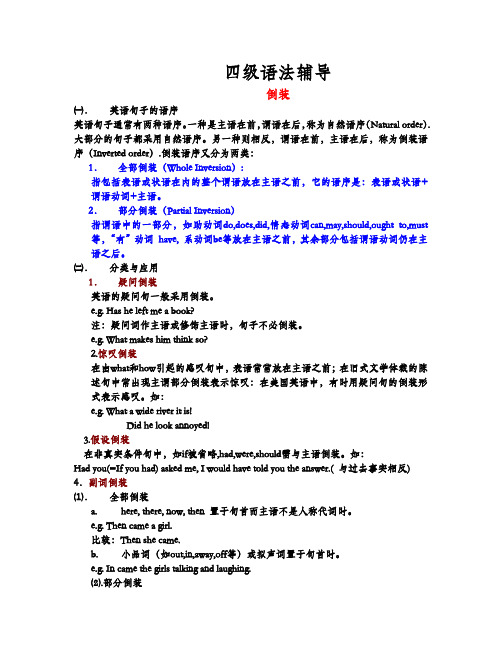
四级语法辅导倒装㈠.英语句子的语序英语句子通常有两种语序。
一种是主语在前,谓语在后,称为自然语序(Natural order).大部分的句子都采用自然语序。
另一种则相反,谓语在前,主语在后,称为倒装语序(Inverted order).倒装语序又分为两类:1.全部倒装(Whole Inversion):指包括表语或状语在内的整个谓语放在主语之前,它的语序是:表语或状语+谓语动词+主语。
2.部分倒装(Partial Inversion)指谓语中的一部分,如助动词do,does,did,情态动词can,may,should,ought to,must 等,“有”动词have, 系动词be等放在主语之前,其余部分包括谓语动词仍在主语之后。
㈡.分类与应用1.疑问倒装英语的疑问句一般采用倒装。
e.g. Has he left me a book?注:疑问词作主语或修饰主语时,句子不必倒装。
e.g. What makes him think so?2.惊叹倒装在由what和how引起的感叹句中,表语常常放在主语之前;在旧式文学体裁的陈述句中常出现主谓部分倒装表示惊叹:在美国英语中,有时用疑问句的倒装形式表示感叹。
如:e.g. What a wide river it is!Did he look annoyed!3.假设倒装在非真实条件句中,如if被省略,had,were,should需与主语倒装。
如:Had you(=If you had) asked me, I would have told you the answer.( 与过去事实相反) 4.副词倒装⑴.全部倒装a. here, there, now, then 置于句首而主语不是人称代词时。
e.g. Then came a girl.比较:Then she came.b. 小品词(如out,in,away,off等)或拟声词置于句首时。
e.g. In came the girls talking and laughing.⑵.部分倒装a. 方式副词或often, many a time频度副词置于句首时。
虚拟语气与倒装句型

虚拟语气、倒装句型虚拟语气虚拟语气是通过特殊的谓语动词形式来表达的愿望、假设、怀疑、猜测或建议等语气,它不表示客观存在。
一、虚拟语气在单句中的用法常用来表示祝愿、采用固定的倒装句式。
例如:Long live the People ⨯s Republic of China!中华人民共和国万岁!be happy! 快乐!have a good time! 玩得愉快! succeed! 成功!make progress! 进步!二、虚拟语气在复合句中的用法:1. 在非真实性条件句与主句中的用法1) 表示与现在事实相反如果我是你,我会接受邀请的。
If I had time,I would go there.如果我有空,我就去那儿。
2) 与过去事实相反例如:If you had come earlier,you couldn ⨯t/wouldn ⨯t have missed the bus.如果你早点来,你就不会错过那辆公共汽车了。
If he had seen you yesterday,he would have returned your book.如果他昨天见到了你,他就会还你的书的。
3) 与将来事实可能相反例如:If it should rain/were to rain/rained tomorrow,the sports meet would be put off.万一明天下雨,运动会就推迟。
(事实上明天下雨的可能性不大。
)If you dropped/should drop/were to drop the glass,it would break.万一杯子掉下来会打碎的。
4) i f 的省略如果条件句中有were,had,should 等助动词,可将if 省略,而把were,had 或should置于句首,来表达以if 引导的条件句的相同意思。
例如:Should it rain/were it to rain tomorrow,the sports meet would be put off./Had he seen May you 祝你you yesterday,he would have returned your book.5)条件句或主句的省略当有上下文或上下句中的语言环境暗示的时候,表示虚拟语气的从句或主句往往可以省略,以避免重复。
语法复习:虚拟语气和倒装句综合

语法复习:虚拟语气和倒装句知识总结与归纳:虚拟语气:是一种与事实(包括过去,现在或将来)完全相反的陈述,表示假设,愿望,怀疑,推测或后悔。
虚拟语气主要用于条件从句,让步从句和名词性从句。
虚拟语气句型中常见的动词形式:1. 动词过去式2. had done3. would/could/should/might do4. would/could/should/might have done5. were(一)虚拟语气用在与过去事实相反的假设的条件句中:表示假设,后悔或推测。
句型结构:If +主语+had been/done….,主语+should/could/might/would + have done….1. If the illness had been diagnosed a day earlier, it might have made all different.2. If she had told him about the danger, he would not have got hurt.3. If I had known more about giving first aid, I could have helped him.(二)虚拟语气用在与现在事实相反的假设的条件句中:句型结构:If +主语+were / 动词过去式,主语+should/could/might/would +do1. If I had HIV, I would know because I would feel sick.2. If I were you, I would give an AIDS patient a hug.3. 虚拟语气用在与将来的结果相反的假设的条件句中:句型结构:If +主语+were to do, 主语+should/could/might/would +doIf +主语+should doIf +主语+动词过去式(1)If we were to panic, we would not be able to help.(2)If the little girl should take piano lessons, she would have less free time.(3)If I were to live long enough to have a job, I would choose to be a doctor, helping these AIDS patients.注意:虚拟条件句的从句中如果有助动词were; had或should可以去掉if以后用倒装句语序。
虚拟语气倒装
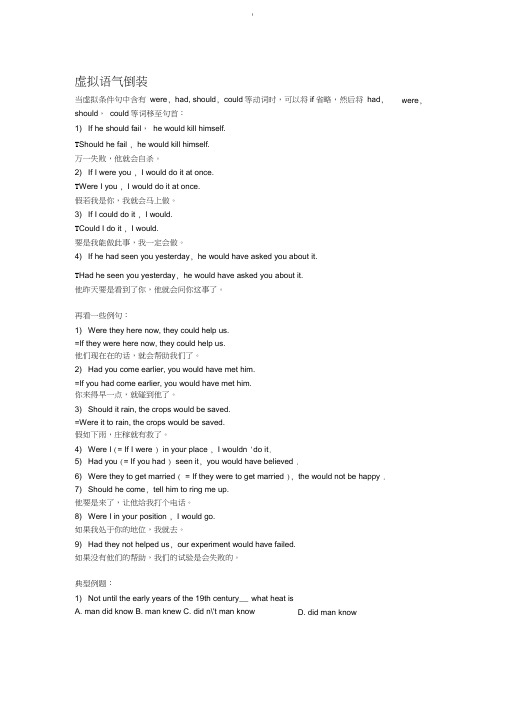
虚拟语气倒装当虚拟条件句中含有were, had, should, could等动词时,可以将if省略,然后将had, should,could等词移至句首:1) If he should fail,he would kill himself.T Should he fail , he would kill himself.万一失败,他就会自杀。
2) If I were you , I would do it at once.T Were I you , I would do it at once.假若我是你,我就会马上做。
3) If I could do it , I would.T Could I do it , I would.要是我能做此事,我一定会做。
4) If he had seen you yesterday, he would have asked you about it.T Had he seen you yesterday, he would have asked you about it.他昨天要是看到了你,他就会问你这事了。
再看一些例句:1) Were they here now, they could help us.=If they were here now, they could help us.他们现在在的话,就会帮助我们了。
2) Had you come earlier, you would have met him.=If you had come earlier, you would have met him.你来得早一点,就碰到他了。
3) Should it rain, the crops would be saved.=Were it to rain, the crops would be saved.假如下雨,庄稼就有救了。
4) Were I (= If I were ) in your place , I wouldn 'do it.5) Had you (= If you had ) seen it, you would have believed .6) Were they to get married ( = If they were to get married ), the would not be happy .7) Should he come, tell him to ring me up.他要是来了,让他给我打个电话。
英语语法中的倒装句和虚拟语气
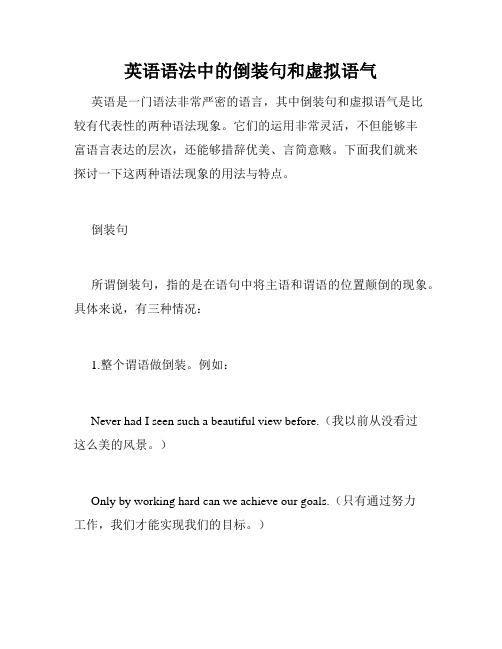
英语语法中的倒装句和虚拟语气英语是一门语法非常严密的语言,其中倒装句和虚拟语气是比较有代表性的两种语法现象。
它们的运用非常灵活,不但能够丰富语言表达的层次,还能够措辞优美、言简意赅。
下面我们就来探讨一下这两种语法现象的用法与特点。
倒装句所谓倒装句,指的是在语句中将主语和谓语的位置颠倒的现象。
具体来说,有三种情况:1.整个谓语做倒装。
例如:Never had I seen such a beautiful view before.(我以前从没看过这么美的风景。
)Only by working hard can we achieve our goals.(只有通过努力工作,我们才能实现我们的目标。
)注意,这种倒装通常用于强调句子中的某一部分,比如"never"和"only"这样的副词。
在平常的口语和写作中,这种用法并不常见。
2.助动词和主语的位置互换。
例如:Are you going to the party tonight? -> Are you not going to theparty tonight?He has finished the report. -> Has he finished the report?这种倒装在否定句和疑问句中比较常见。
3.只有谓语的一部分做倒装。
例如:Up the hill walked the little girl.(小女孩沿着山坡走了。
)In the garden sat the old man.(老人坐在花园里。
)这种倒装通常在口语和文学作品中出现,英语中很多歌曲和诗歌也会使用这种语法结构。
总体来说,倒装结构让英语句子的语序独特,增加了句子的语言美感和表达效果。
虚拟语气虚拟语气(Subjunctive Mood)是英语语法中非常重要的一个概念。
虚拟语气主要用来表达一些虚构的假设或者反事实情况,比如愿望、建议、命令、条件句等等。
虚拟语气和倒装

倒装的分类
完全倒装
例如,“Here comes the bus.”(公交车来了。)这句话中, 谓语“comes”完全提前到了句首。
部分倒装
例如,“Only in this way can we solve the problem.”(只 有这样,我们才能解决这个问题。)这句话中,情态动词“can” 提前到了主语“we”之前,但谓语“solve”没有提前。
分放在句子的哪个位置?
04
答案:句首。
翻译题
翻译题1
请将以下中文句子翻译成 英文,注意使用虚拟语气。
答案
If I were you, I would choose a different profession.
句子
Were you to ask him, he would help you.
句子
如果我是你,我会选择不 同的职业。
倒装的用法
要点一
强调
使用倒装可以强调某个信息,例如, “Out dashed the cat.”(那只猫冲 了出来。)这句话中,通过将 “dashed”提前到句首,强调了猫冲 出的动作。
要点二
平衡句子结构
在句子中,有时为了平衡句子的结构, 会使用倒装。例如,“The book is not only cheap but also of good quality.”(这本书不仅便宜,而且质 量很好。)这句话中,为了平衡“not only”和“but also”,使用了部分倒 装。
虚拟语气的分类
01
02
03
条件虚拟
英语虚拟语气及倒装精简总结
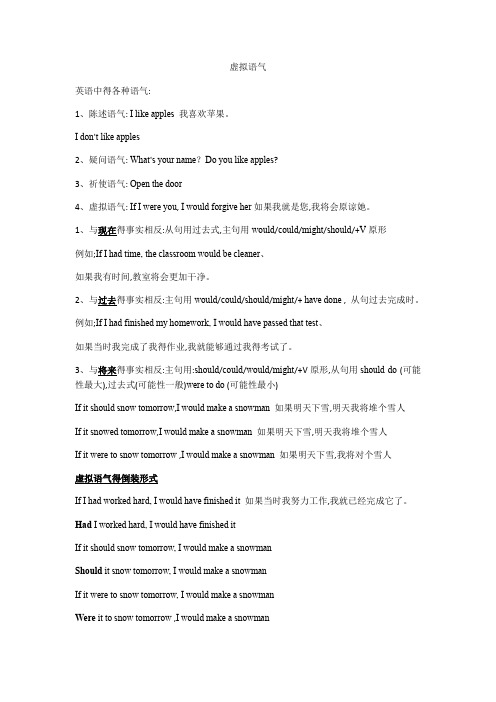
虚拟语气英语中得各种语气:1、陈述语气: I like apples我喜欢苹果。
I don't like apples2、疑问语气: What's your name?Do you like apples?3、祈使语气: Open the door4、虚拟语气: If I were you, I would forgive her如果我就是您,我将会原谅她。
1、与现在得事实相反:从句用过去式,主句用would/could/might/should/+V原形例如;If I had time, the classroom would be cleaner、如果我有时间,教室将会更加干净。
2、与过去得事实相反:主句用would/could/should/might/+ have done , 从句过去完成时。
例如;If I had finished my homework, I would have passed that test、如果当时我完成了我得作业,我就能够通过我得考试了。
3、与将来得事实相反:主句用:should/could/would/might/+V原形,从句用should do (可能性最大),过去式(可能性一般)were to do (可能性最小)If it should snow tomorrow,I would make a snowman如果明天下雪,明天我将堆个雪人If it snowed tomorrow,I would make a snowman如果明天下雪,明天我将堆个雪人If it were to snow tomorrow ,I would make a snowman如果明天下雪,我将对个雪人虚拟语气得倒装形式If I had worked hard, I would have finished it如果当时我努力工作,我就已经完成它了。
Had I worked hard, I would have finished itIf it should snow tomorrow, I would make a snowmanShould it snow tomorrow, I would make a snowmanIf it were to snow tomorrow, I would make a snowmanWere it to snow tomorrow ,I would make a snowman虚拟语气在各类从句中得用法1、I lifted the chair so that I could be seen我举起椅子就就是为了能被瞧见(状语从句)状语从句中常见连接词:as if好像,as though好像,in order that为了,for fear that生怕,In case万一。
虚拟语气与倒装句
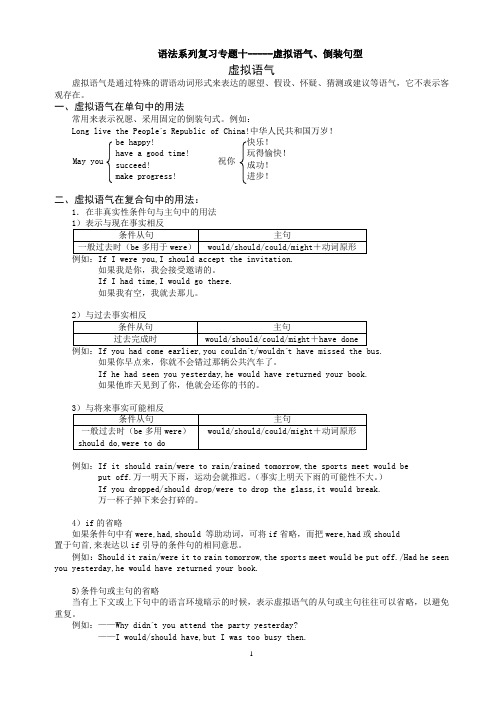
语法系列复习专题十-----虚拟语气、倒装句型虚拟语气虚拟语气是通过特殊的谓语动词形式来表达的愿望、假设、怀疑、猜测或建议等语气,它不表示客观存在。
一、虚拟语气在单句中的用法常用来表示祝愿、采用固定的倒装句式。
例如:Long live the People s Republic of China!中华人民共和国万岁!be happy! 快乐!have a good time! 玩得愉快! succeed!成功! make progress! 进步!二、虚拟语气在复合句中的用法:1. 在非真实性条件句与主句中的用法如果我是你,我会接受邀请的。
If I had time,I would go there.如果我有空,我就去那儿。
如果你早点来,你就不会错过那辆公共汽车了。
If he had seen you yesterday,he would have returned your book.如果他昨天见到了你,他就会还你的书的。
例如:If it should rain/were to rain/rained tomorrow,the sports meet would be put off.万一明天下雨,运动会就推迟。
(事实上明天下雨的可能性不大。
)If you dropped/should drop/were to drop the glass,it would break.万一杯子掉下来会打碎的。
4) i f 的省略如果条件句中有were,had,should 等助动词,可将if 省略,而把were,had 或should置于句首,来表达以if 引导的条件句的相同意思。
例如:Should it rain/were it to rain tomorrow,the sports meet would be put off./Had he seen you yesterday,he would have returned your book.5)条件句或主句的省略当有上下文或上下句中的语言环境暗示的时候,表示虚拟语气的从句或主句往往可以省略,以避免重复。
英语虚拟语气及倒装精简总结
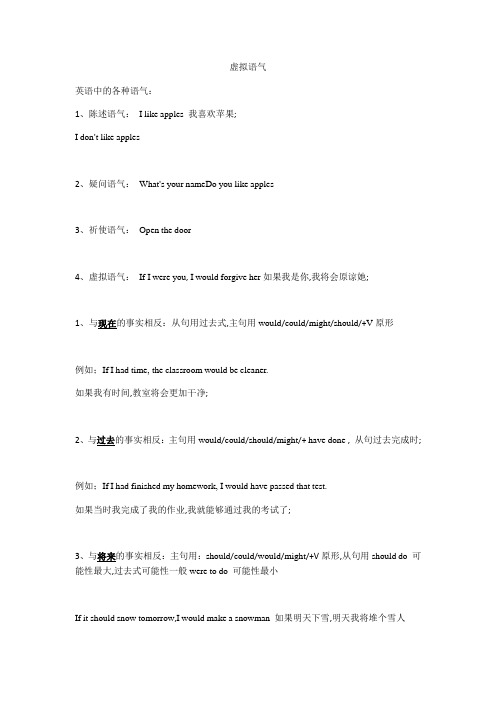
虚拟语气英语中的各种语气:1、陈述语气:I like apples我喜欢苹果;I don't like apples2、疑问语气:What's your nameDo you like apples3、祈使语气:Open the door4、虚拟语气:If I were you, I would forgive her如果我是你,我将会原谅她;1、与现在的事实相反:从句用过去式,主句用would/could/might/should/+V原形例如;If I had time, the classroom would be cleaner.如果我有时间,教室将会更加干净;2、与过去的事实相反:主句用would/could/should/might/+ have done , 从句过去完成时;例如;If I had finished my homework, I would have passed that test.如果当时我完成了我的作业,我就能够通过我的考试了;3、与将来的事实相反:主句用:should/could/would/might/+V原形,从句用should do可能性最大,过去式可能性一般were to do可能性最小If it should snow tomorrow,I would make a snowman如果明天下雪,明天我将堆个雪人If it snowed tomorrow,I would make a snowman如果明天下雪,明天我将堆个雪人If it were to snow tomorrow ,I would make a snowman如果明天下雪,我将对个雪人虚拟语气的倒装形式If I had worked hard, I would have finished it如果当时我努力工作,我就已经完成它了; Had I worked hard, I would have finished itIf it should snow tomorrow, I would make a snowmanShould it snow tomorrow, I would make a snowmanIf it were to snow tomorrow, I would make a snowmanWere it to snow tomorrow ,I would make a snowman虚拟语气在各类从句中的用法1、I lifted the chair so that I could be seen我举起椅子就是为了能被看见状语从句状语从句中常见连接词:as if好像,as though好像,in order that为了,for fear that生怕,In case万一;2、主语从句:It is +形容词+that+ 主语+should+动词原形,should可以省略It is very important that we should study English every day我们每天学习英语是很重要的;3、宾语从句;I wish I would visit the moon我祝愿自己能有一天拜访月球;宾语从句常见句型:主语+常见动词+that+ 主语+ should+动词原形I suggest that you should do your homework我建议你应该做你的作业;4、表语从句;He looked as if he had been here for many years他看起来好像已经很多年了;5、同位语从句:I make a proposal that we should hold a meeting next week我提议下周召开一次会议虚拟语气常见词汇:demand,require,proposal,advise,order,suggest虚拟语气的其他用法:6、祝愿:Long live peace和平万岁7、It is hightime that+ 主语+ should/过去式:该做……的时候了;It's time that we had a break我们早该休息了;It's hightime that we should protect ourselves我们是时候保护我们自己了;8、If only引出感叹句,意思是“要是…..多好”,表示说话人的一种愿望;表示现在的情况,应用过去式;表示过去的情况,应用过去完成时态表示将来的情况,用would+动词原形If only he didn’t drive so fast.现在Look at the terrible situation I am in If only I had followed your advice.过去If only the rain would stop将来9、Even if/even though表示一种让步语气,即使...也做不成某事;表示现在的情况,应用过去式表示过去的情况,应用过去完成时态Even if he were here,he could not solve the problem.Even if I had been busy then,I would have helped you.练习:1. If only he ____quietly as the doctor instructed, he would not suffer so much now.A. liesB. layC. had lainD. should lie2. How I wish every family ____a large house with a beautiful garden.A. hasB. hadC. will haveD. had had3. You did not let me drive. If we ____in turn, you ____ so tiredA. drove; didn’t getB. drove; wouldn’t getC. were driving; wouldn’t getD. had driven ; wouldn’t have got4. _____it rain tomorrow, we would have to put off the visit to the Yangpu BridgeA. WereB. ShouldC. WouldD. Will5. I suggested the person _____ to be put into prisonA. refersB. referringC. referredD. refer6. When a pencil is partly in a glass of water, it looks as if it____A. breaksB. has brokenC. were brokenD. had been broken7. I insisted _____to see a doctor, but he insisted nothing ___ wrong with himA. on him to go; should beB. he went; beC. he go; wasD. he should to; is8. ---Your aunt invites you to the movies today---I would rather she ____ me tomorrow than todayA. tellsB. toldC. would tellD. had told9. ---Would you have called her up---Yes, but I ____busy doing my homeworkA. wasB. wereC. had beenD. would be10. I was ill that day, otherwise I ____ the sports meetA. would have taken part inB. took part inC. had taken part inD. would take part in倒装句为了强调或平衡句子结构,英语中常用倒装;倒装有全部倒装和部分倒装;全部倒装是指将句子中的谓语动词全部置于主语之前;部分倒装是指将谓语的一部分如助动词或情态动词置于主语之前;如果句中的谓语没有助动词或情态动词,则需添加助动词do,does或did等,并将其置于主语之前;1.以here,there,now,then等地点或时间副词开头的句子,谓语动词是be, come, go, remain 等,而主语又是名词时,用全部倒装;注意:如果句子的主语是代词时,则不倒装;如:Here comes the bus/ Here it comes2.有些动词与副词out,in,up,down,away等构成不及物动词短语;为了使句子更生动,常将这些副词提前到句首,这时用全部倒装;注意:句子的主语是代词时,则不倒装;如:Up went the rocket. / Up it went.3.将表示地点的介词短语放在句首进行强调时,使用全部倒装;谓语动词常为不及物动词;如:From the window came the sound of music.4.当句子主语部分较长,谓语部分较短,或为了强调句子的表语时,常使用全部倒装;句子的结构为“表语+系动词+主语”;如:Gone are the days when we had nothing to eat.5.if虚拟条件状语从句中,如果将连词if省略,需用部分倒装;如:Were I you, I would go there.6. as引导的让步状语从句的倒装有如下几种形式:1 从句的谓语部分为“不及物动词+副词”时,常将此副词提前到从句句首;如:Hard as you try, you will not be satisfied.2 从句的谓语部分为“情态动词+不及物动词”时,常将此动词提前到从句句首;如:Wait as you may, he will not see you.3 从句的谓语部分是“系动词+形容词”时,常将此表语形容词提前到从句句首;如:Proud as the nobles are, they are afraid to see me.4 从句的谓语部分是“系动词+单数名词”时,则常将这个表语提前,但要省略名词前的不定冠词;如:Child as he is, he can tell right from wrong.7.具有半否定意义的词或短语位于句首时,用部分倒装;如:seldom, rarely, not, never, by no means, in no time, hardly...when, no sooner...than, not only...but also等;如:Not only does he do well in his lessons, but also he often helps others with their lessons. Hardly did I notice the signal when I caught by police.8.“only+状语”位于句首时, 用部分倒装;如:Only then did I know the importance of English.9.so...that结构中,有时要强调so所修饰的形容词或副词,常将so 连同它所修饰的形容词或副词一起提前放在句首;如:So bright was the moon that the flowers seem as bright as by day.10. 最突出、最常见的修辞效果就是强调,其表现形式如下:1only +状语或状语从句置于句首,被该状语修饰的句子用部分倒装;Only in this way can you solve this problem.只有用这种方法,你才可以解决这个问题;Only after he had spoken out the word did he realize he had made a big mistake.只有当他已经说出那个字后才意识到自己犯了个大错误;2 hardly,in no way,little,scarcely,seldom,never,no more,no longer,not,not only,no sooner,not only …but also,not until…等具有否定意义的词或词组位于句首,句子用部分倒装;Hardly do I know chemistry.= I hardly know chemistry.1. Not until I began to work ____ how much time I had wasted.A. didn't I realizeB. did I realizeC. I didn't realizeD. I realized2. Only by practising a few hours every day ____ be able to master the language.A. you canB. can youC. you willD. will you3. If you don't go, neither ____.A. shall IB. do IC. I doD. I shall4. No sooner ____ to the station ____ the train left.A. had I got, whenB. I had got, thanC. had I got, thanD. did I get, when5. ——Your father is very strict with you.____. He never lets off a single mistake of ours.A. So he isB. So is heC. He is soD. So does he6. ____ today, he would get there by Sunday.A. Would he leaveB. Was he leavingC. Were he to leaveD. If he leave7. Never in my life ____ such a thing.A. I have heard or have seenB. have I heard or seenC. I have heard or seenD. did I hear or see8. ——Here ____ Where is Xiao LiuThere ____.A. comes the bus, is heB. comes the bus, he isC. the bus comes, is heD. the bus comes, he is9. ____ , I will not buy it.A. Much as do I like itB. As much I like itC. Much as I like itD. As I like it much10. ——I like football. I don't like volleyball.A. So do IB. Neither do IC. So it is with meD. So is it with me。
基础英语语法7虚拟语气与倒装

Translation:
1.如果我是你,我会更加努力地学习。 If I were you, I would study harder.
2.我昨天要是去看医生就好了。这样, 我现在应该感觉好多了。 I wish I had gone to see the doctor yesterday. If so, I should feel better now.
If I worked hard, I might have money. If I had a lot of money, I could buy a ticket. If I bought a ticket, I would be on board. If I were on board, I should sail for America.
It’s (about/high/ good ) time that…,表示“该是……的时候了”, 含有 “晚一点” 的意思, 表示建议现在应该做什么事,从句一般用 一般过去时。 It’s time you went to bed. It’s high time that we took action.
注意:表示不可思议、滑稽、不可想象、令人吃惊这样的形容词 如amazing, strange, odd, ridiculous, surprising, unthinkable, incredible等后的that从句中should一般不省略,而且翻译为 “竟然”, 表示说话人的惊异、懊悔、失望等情感。 It is surprising that they should pass the time like that. It is incredible that Jane should have finished her paper so soon.
虚拟语气倒装从句

Part One 虚拟语气(Subjunctive Mood)表示与事实相反的假设或将来不太可能实现的愿望。
使用场合:1.1)与过去事实相反:would / should / could / might + have done if…had doneI would have passed the English exam if you had helped me.2) 与现在事实相反:would / should / could / might + v if…v-ed (但be的过去式通常用were)What would you do if you were me?3) 与将来事实相反:would / should / could / might + v if…were to + v 或should + vWe would hold a party if you were to arrive tomorrow.*主句中的should通常用于第一人称,从句中的should各人称通用。
*在if引导的虚拟条件从句中可以把if省略,并将had, should或were提到句首。
如:a. I would have passed the English exam if you had helped me. =I would have passed the English exam had you helped me.b. What would you do if you were me? =What would you do were you me?c. We would hold a party if you were to arrive tomorrow. =We would hold a party were you to arrive tomorrow.*如果从句和主句中的时间不一致,则要分别使用相对应的动词形式。
语法:虚拟语气和倒装句
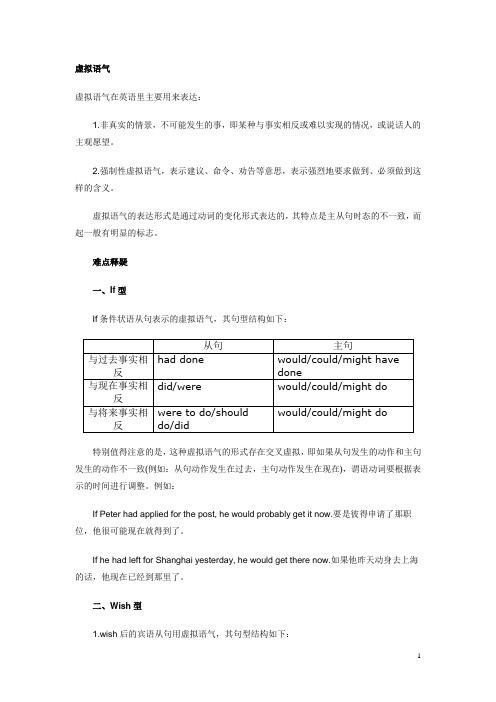
虚拟语气虚拟语气在英语里主要用来表达:1.非真实的情景,不可能发生的事,即某种与事实相反或难以实现的情况,或说话人的主观愿望。
2.强制性虚拟语气,表示建议、命令、劝告等意思,表示强烈地要求做到、必须做到这样的含义。
虚拟语气的表达形式是通过动词的变化形式表达的,其特点是主从句时态的不一致,而起一般有明显的标志。
难点释疑一、If型If条件状语从句表示的虚拟语气,其句型结构如下:特别值得注意的是,这种虚拟语气的形式存在交叉虚拟,即如果从句发生的动作和主句发生的动作不一致(例如:从句动作发生在过去,主句动作发生在现在),谓语动词要根据表示的时间进行调整。
例如:If Peter had applied for the post, he would probably get it now.要是彼得申请了那职位,他很可能现在就得到了。
If he had left for Shanghai yesterday, he would get there now.如果他昨天动身去上海的话,他现在已经到那里了。
二、Wish型1.wish后的宾语从句用虚拟语气,其句型结构如下:与过去事实相反wish that 从句的谓语动词用had done与现在事实相反wish that 从句的谓语动词用did与将来事实相反wish that 从句的谓语动词用would/could do例如:I wish they would change the menu.他们要是改变一下菜单就好了。
I wish I hadn’t spent so much money.我要是没花那么多的钱就好了。
同样地,在as if/as though引导的宾语从句中和以if only引导的带有感叹色彩的虚拟语气句子中,谓语动词与wish引导的宾语从句中的虚拟形式相同。
2.由if only 引导的虚拟语气与过去事实相反if only 谓语动词用had done与现在事实相反if only 谓语动词用did例如:If only she had asked someone’s advice! 她要是征求了别人的意见就好了!3.由as if/as though 引导的虚拟语气与过去事实相反as if/as though谓语动词用had done与现在事实相反as if/as though谓语动词用did例如:He talks about Rome as if he had been there himself.谈论起罗马来就像他去过似的。
- 1、下载文档前请自行甄别文档内容的完整性,平台不提供额外的编辑、内容补充、找答案等附加服务。
- 2、"仅部分预览"的文档,不可在线预览部分如存在完整性等问题,可反馈申请退款(可完整预览的文档不适用该条件!)。
- 3、如文档侵犯您的权益,请联系客服反馈,我们会尽快为您处理(人工客服工作时间:9:00-18:30)。
当虚拟条件句中含有were,had,should,could等动词时,可以将if省略,然后将were,had,should,could 等词移至句首:
1. If he should fail,he would kill himself.
→Should he fail,he would kill himself.
万一失败,他就会自杀。
2. If I were you,I would do it at once.
→Were I you,I would do it at once.
假若我是你,我就会马上做。
3. If I could do it,I would.
→Could I do it,I would.
要是我能做此事,我一定会做。
4. If he had seen you yesterday,he would have asked you about it.
→Had he seen you yesterday,he would have asked you about it.
他昨天要是看到了你,他就会问你这事了。
顺便说一句,以上移至句首的 had不一定是助动词,如果是实义动词也可倒装:
If he had money,he would buy a car.
→Had he money,he would buy a car.
他要是有钱,他就会买一辆小车。
